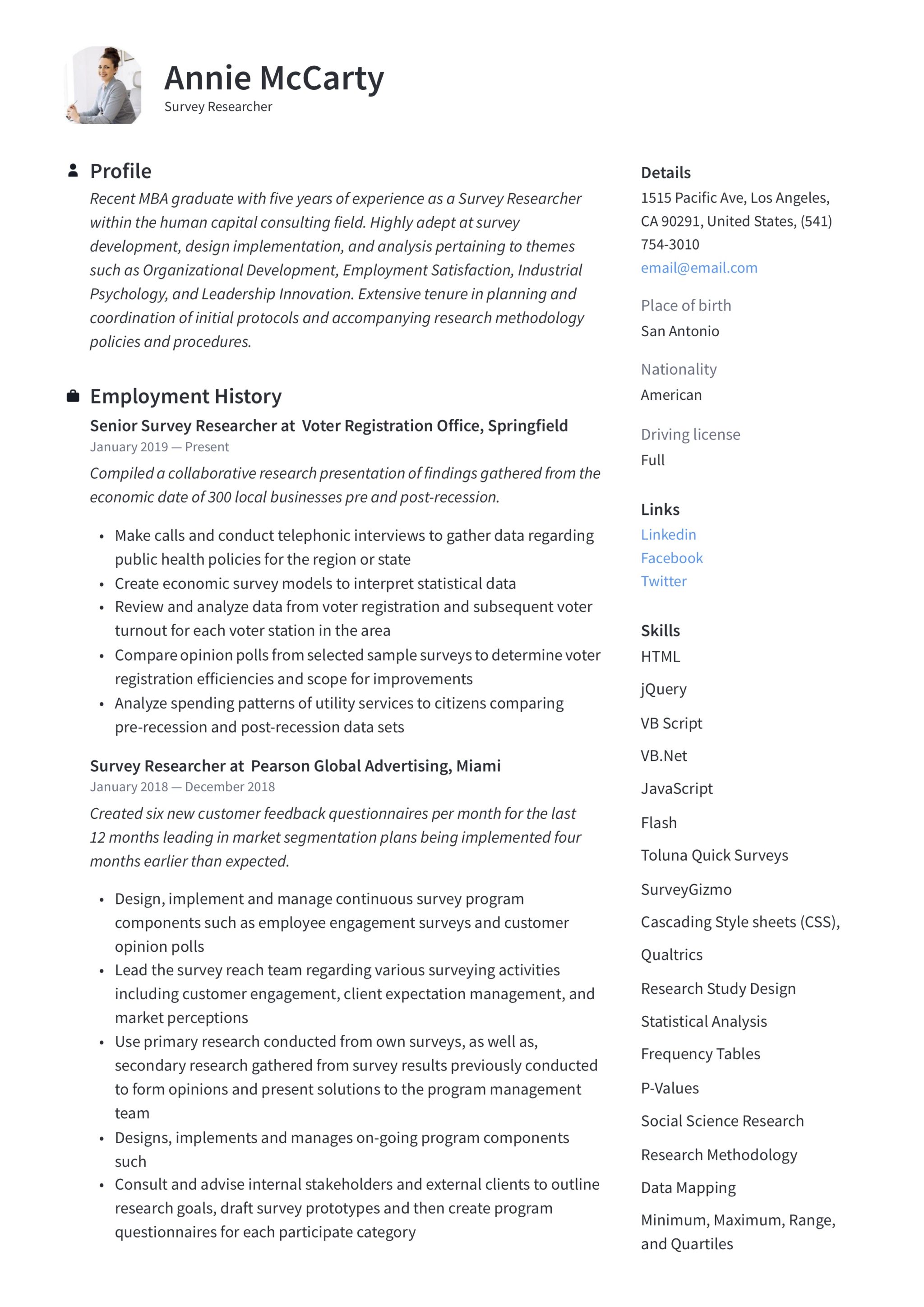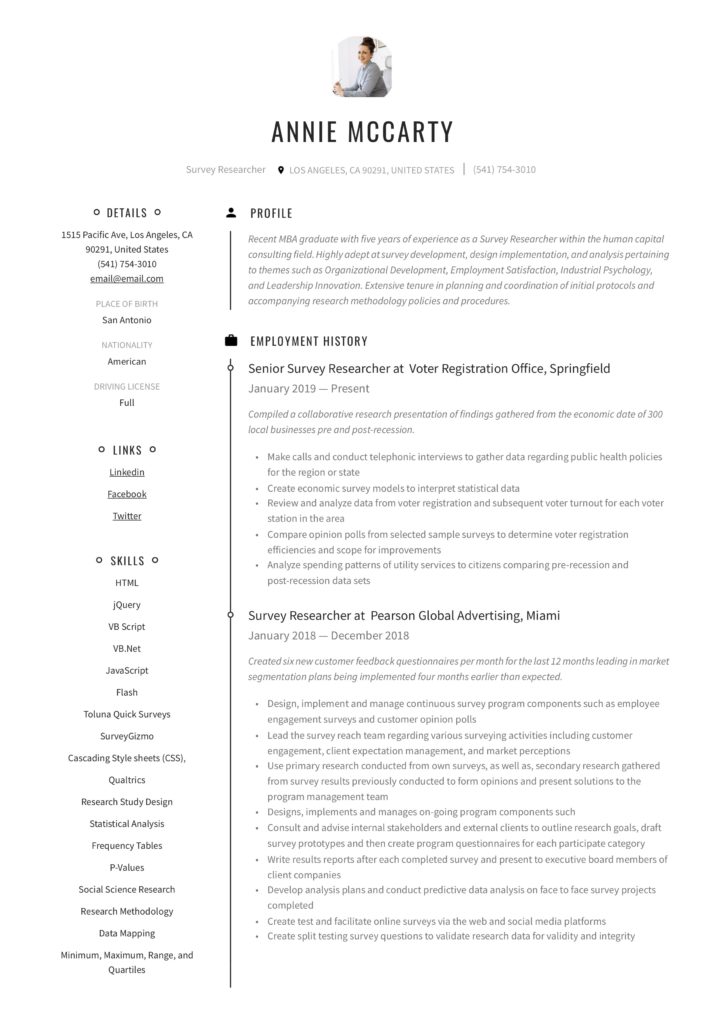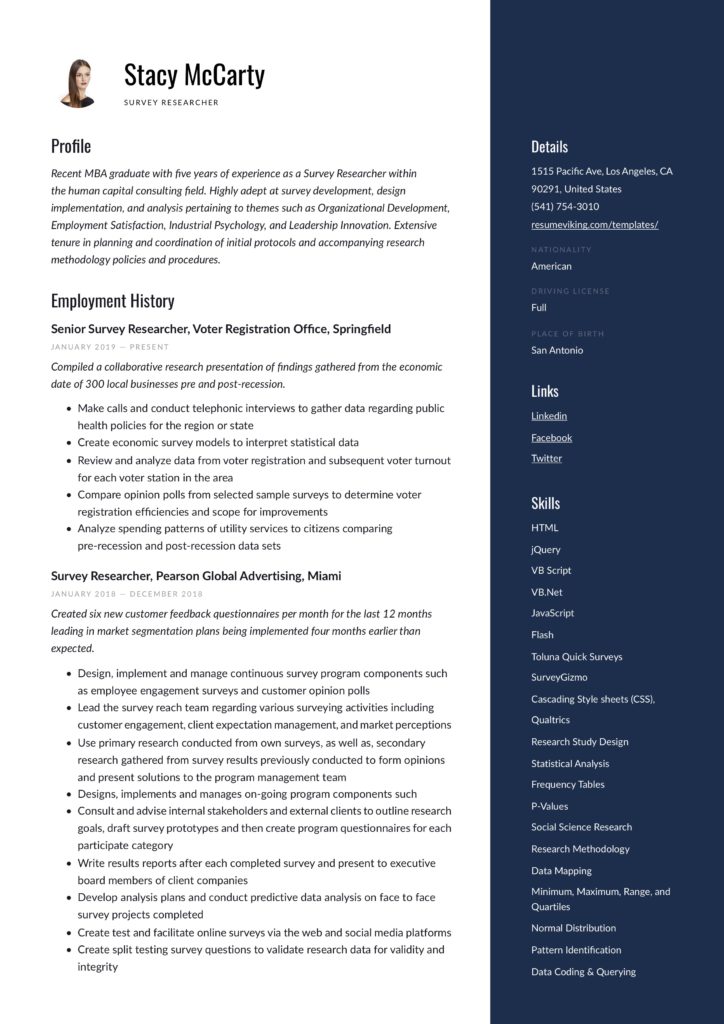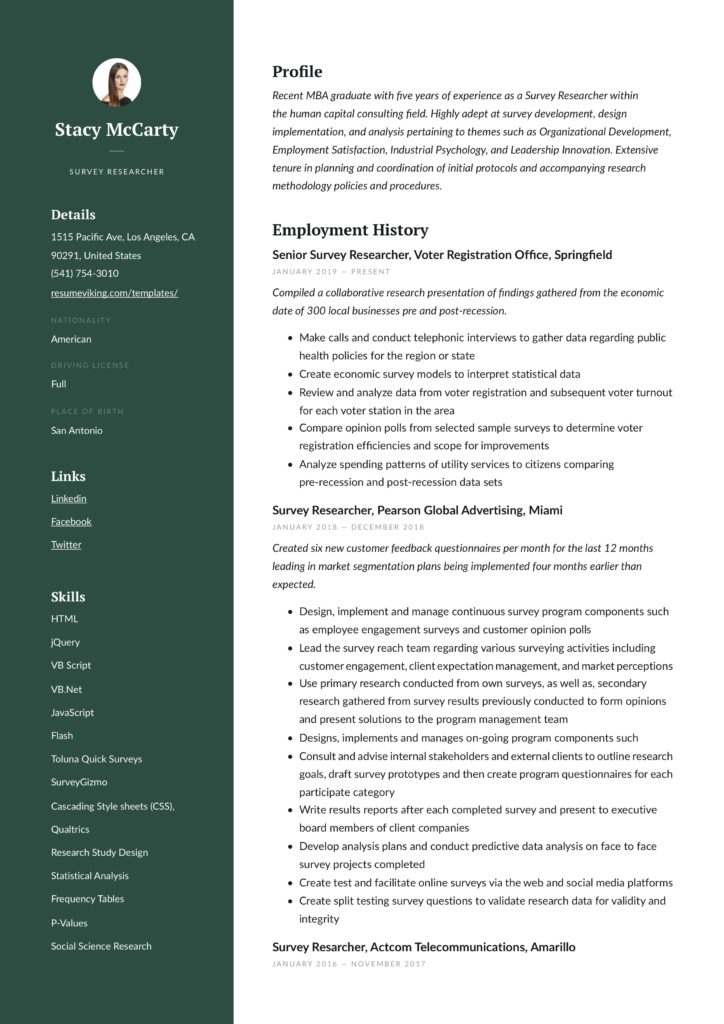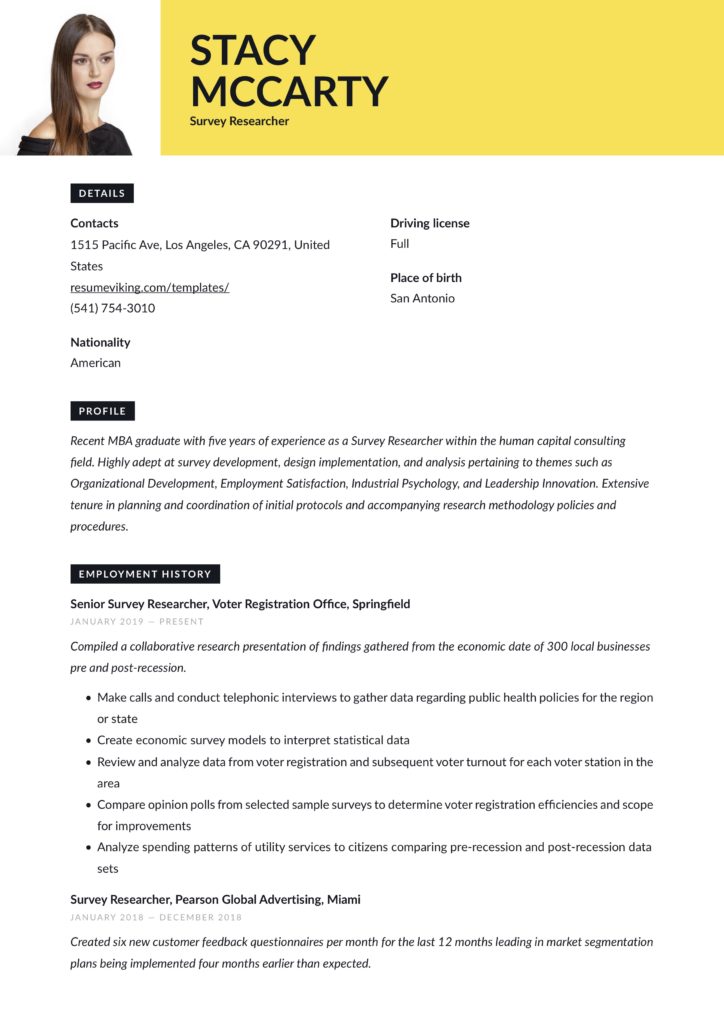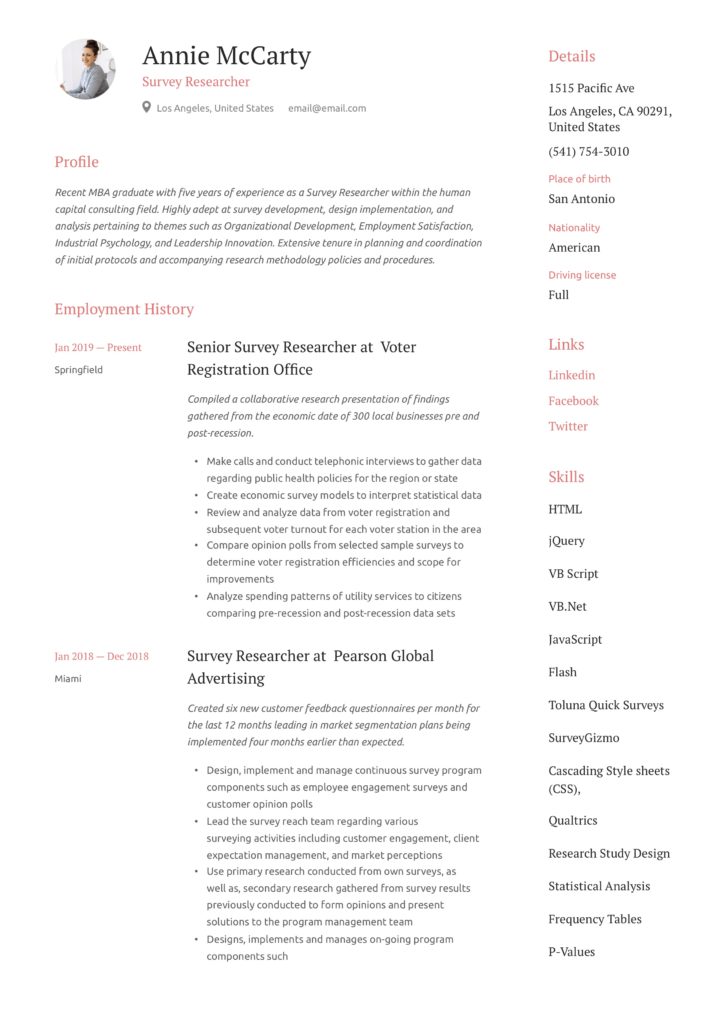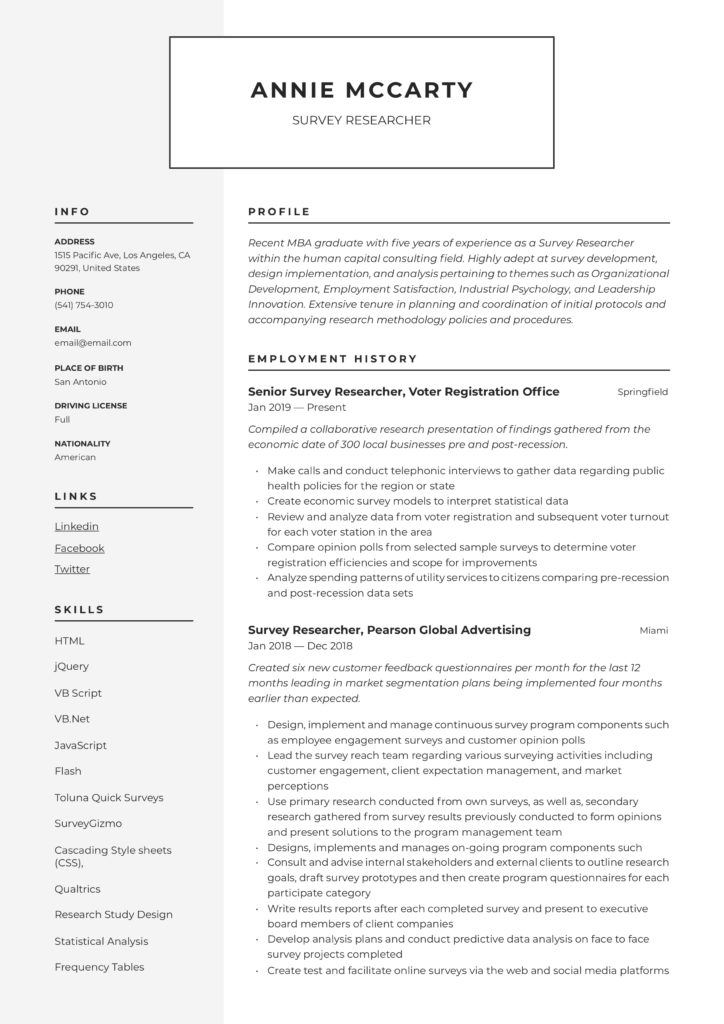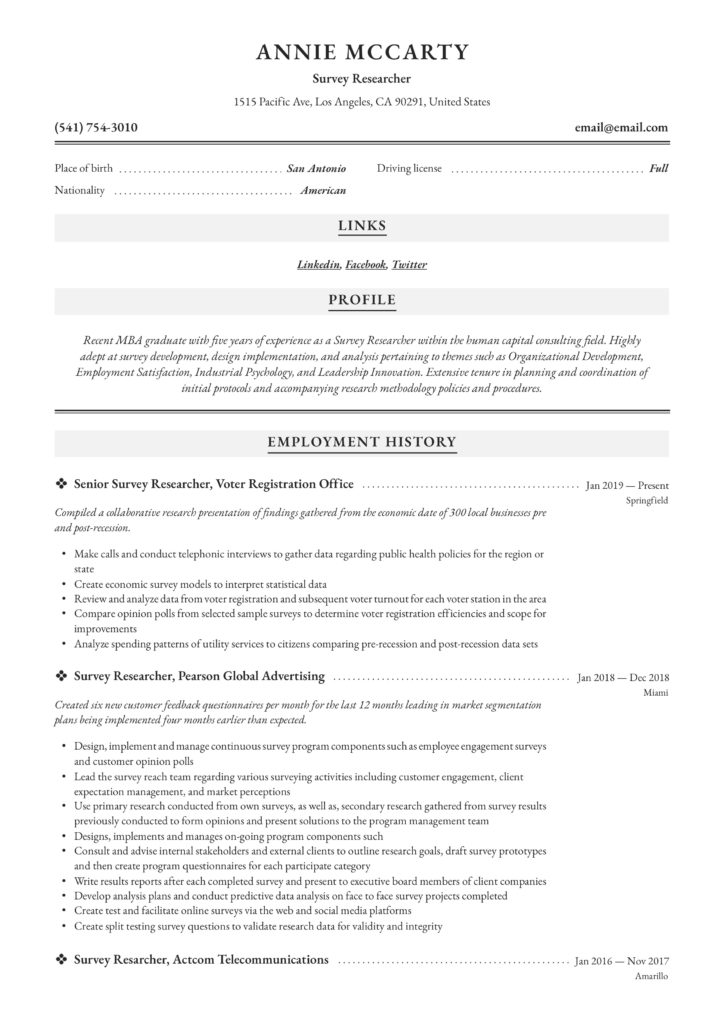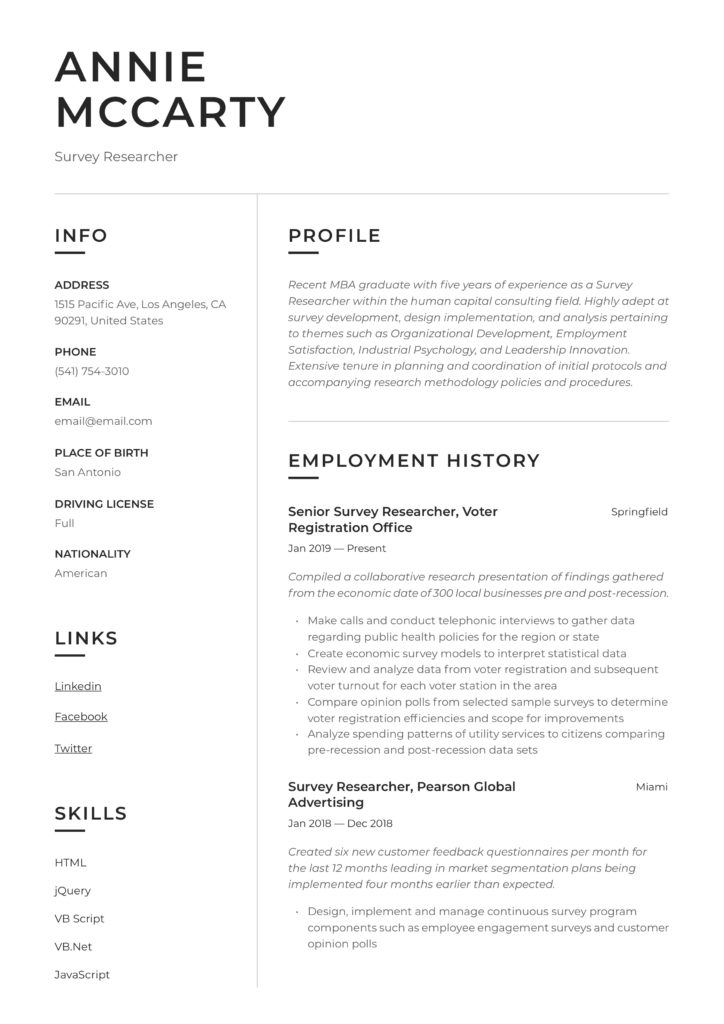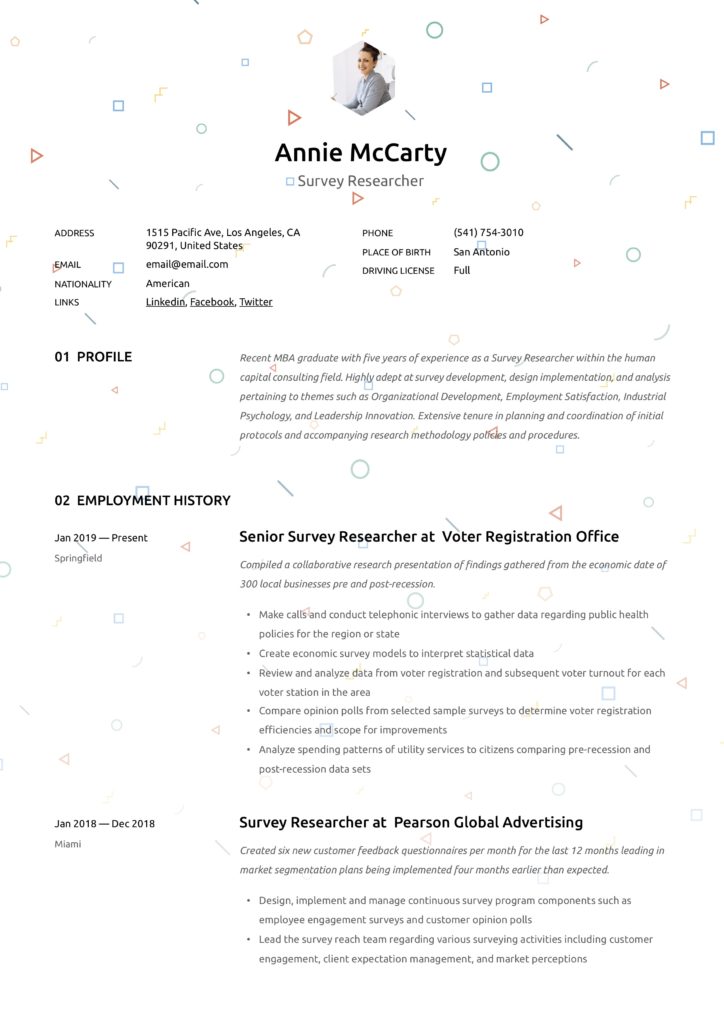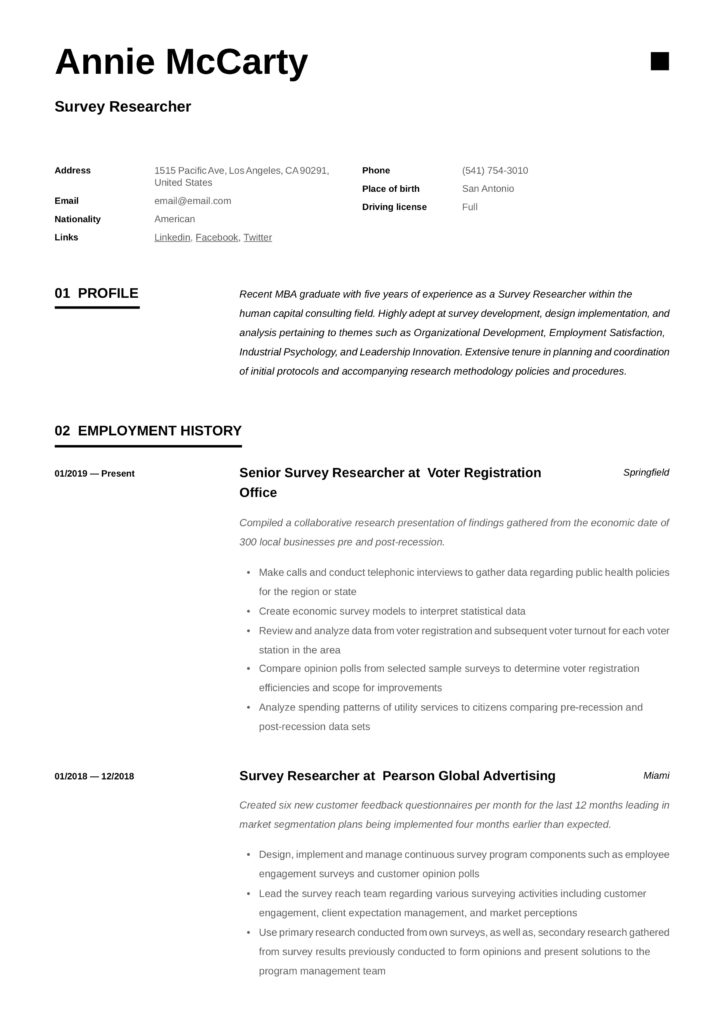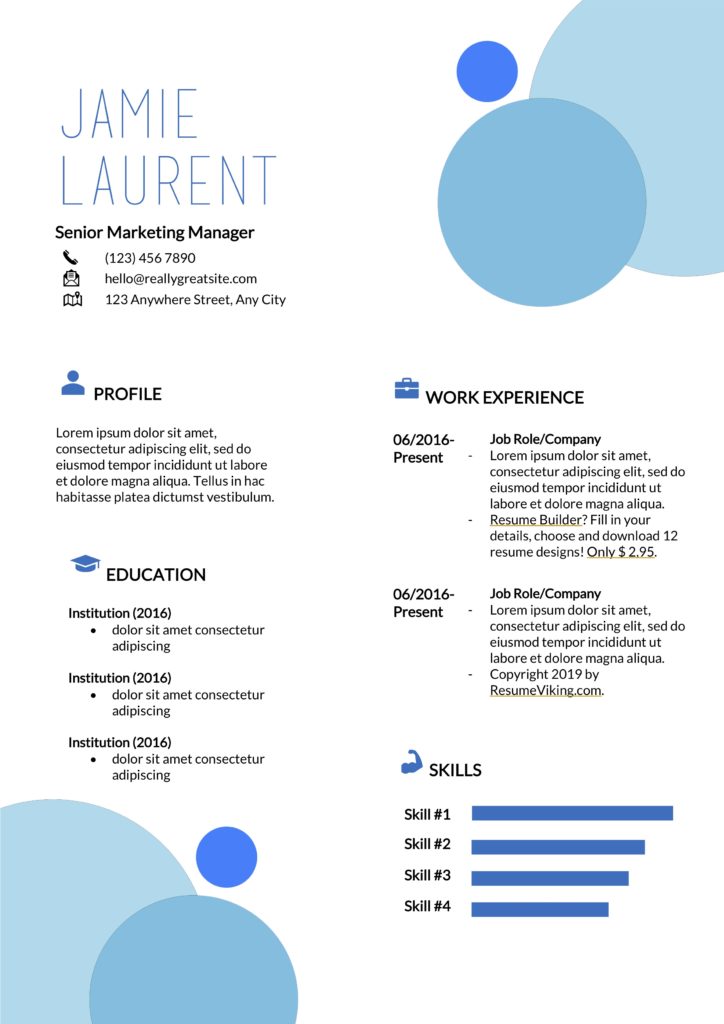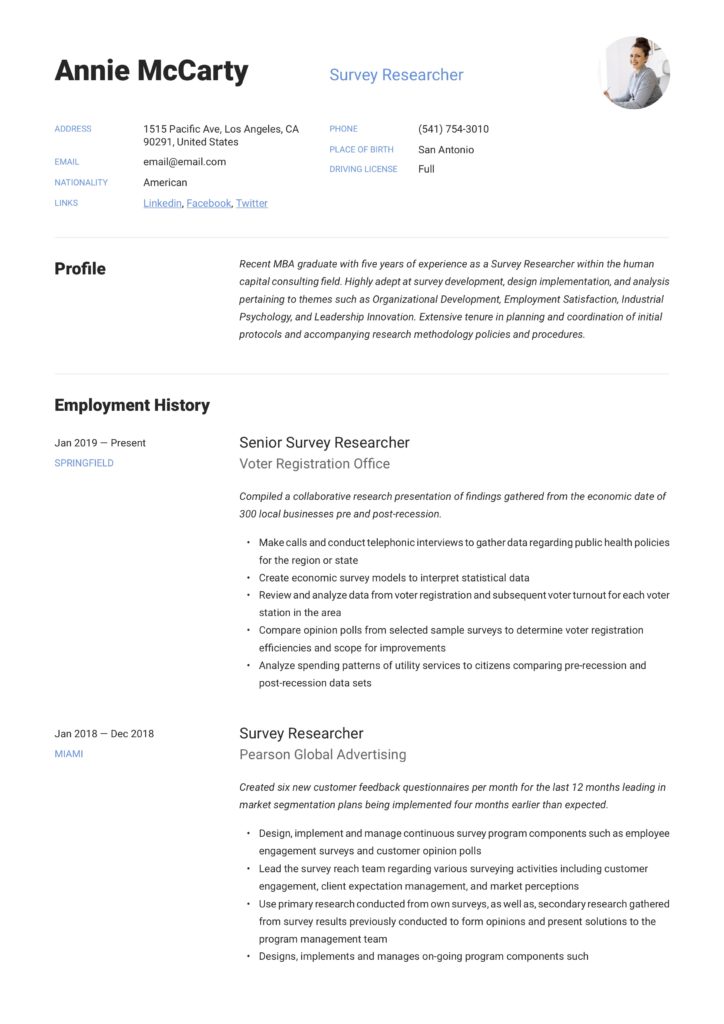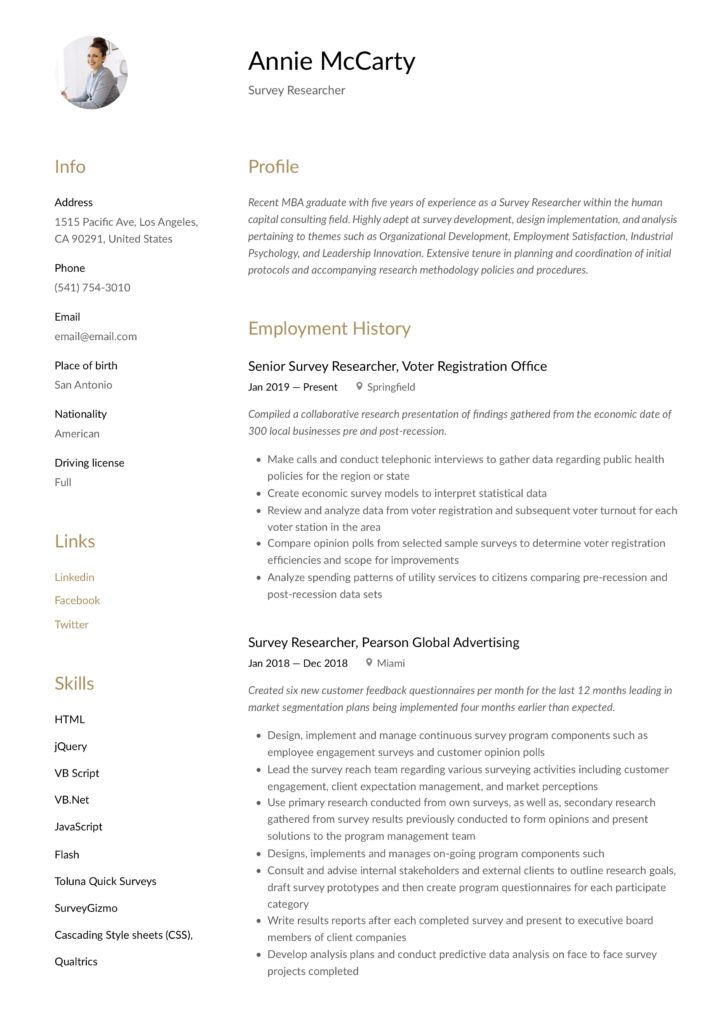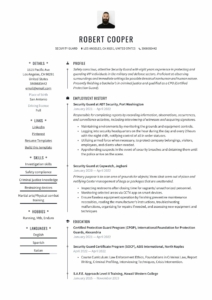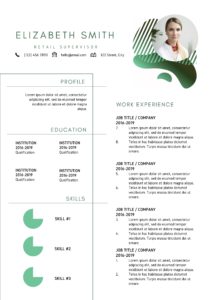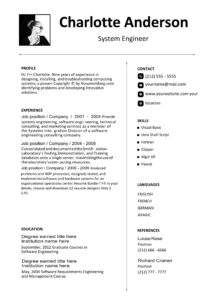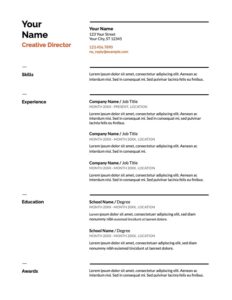Looking for a Survey Researcher position? Then it is crucial first to review a top-notch Survey Researcher resume examples, such as the ones we have provided below.
You want to ensure that your resume stands out from other applications by being informative yet compelling to a hiring manager. All the answers, tools, tips, and tricks you will need to create a professional Researcher Resume, are included in our Resume Guide below.
What you can read in this article
Survey Researcher Resume Examples
(Free sample downloads are at the bottom of this page)
The Survey Researcher Resume Guide
Resume Sections
1. Contact Information:
- Name, Last Name
- Address
- Cell Number
- Be sure to include alternative contact channels like your LinkedIn profile or Facebook URL details.
(Avoid using work numbers or emails).
2. Career Summary:
Use your career synopsis (summary) to entice the reader to review your entire resume. In the abstract, write 3-6 sentences to highlight the most prominent aspects of your expertise, core competencies, years of experience, and noteworthy achievements and research findings.
3. Qualifications Summary:
A Bachelor Degree as the minimum requirement is needed to apply for a Survey Researcher role. Usually, candidates would have majors in research, analytics, statistics, mathematics, or social sciences. For roles at mid-tier or senior stages, job requirements typically list completed Masters’ Degrees and even Ph.D.’s. The overview of your education should be done in reverse chronological order staring your your most recent qualification backward. Apart from the obvious (dates completed, qualification name, institution and location), feel free to your dissertation or thesis topics, GPA’s scores, majors, and also publications or articles you have written or contributed to. Other points to include, such as presentations given, conferences attended, or prestigious projects that you participated in, should also be mentioned in your education section.
4. Relevant Research Experience:
Showcase your employment history within the last 5-10 years in reverse chronological order. You may have also taken a study sabbatical mid-career to complete a Ph.D. If that Is the case list the Ph.D timeframe as part of your job description section to avoid gaps in your resume. The focus of your job duties should align with the position your applying for in terms of research-specific duties that will enhance your suitability ratings. Keep sentences concise and to the point and use bullet formatting as opposed to writing lengthy paragraphs.
5. Other Employment Experience:
Most Survey Researchers may start out in administrative or coordinator-type roles organizing funding, awards and prizes giving ceremonies or lecturing part-time while completing their studies. It is essential to include your other experience in the resume especially if you are applying for your first Survey Researcher job or if you have less than five years of experience as a Survey Researcher.
6. Skills Summary/Key Skills:
A Survey Researcher should possess technical skills in multiple areas. Communicate your core skills, such as proficiencies in research methodologies and documentation management, grant writing, and research application software. A neat trick is to replicate the core skills and competencies listed in the job advertisement into your skills section (if you have them, of course). This adds additional credibility to your resume.
7. Licenses/Certifications/Relevant Coursework/Training:
You do not need to obtain any compulsory licensing or certifications to be a Survey Researcher. However the better qualified you are, the better the chances of securing higher-paying jobs. Certifications, accreditations, courses and continuous professional development programmes offer proof of your professional competencies.
What to Highlight in a Survey Researcher Resume
Survey Researchers design surveys, facilitate survey activities, and analyze data retrieved from these survey projects. The ultimate purpose of a Survey Researcher is to collect data on a topic or multiple topics at a time for example salary information, or medical histories by either asking questions face to face, draw statistics from public information centers or retrieving data from online surveys to comprehend people’s preferences, beliefs, desires or opinions.
Your research, findings, methodologies, and interests are critical to recruiters and hiring managers. However, there are specific aspects to your resume that hiring managers would be looking for when they make shortlisting decisions. We have delved into the most relevant ones below.
The first aspect to highlight is your work setting. Survey Researchers are employed in many types of companies, for example:
- Market research companies
- Polling Organizations
- Non-Profit Survey Firms
- Corporate Organizations
- Management Consulting Firms
- Advertising and Marketing Agencies
- Business Associations
- Political Consulting Companies
- Municipal, Provincial, State and Federal Government Departments
Next, you need to explain the type of research you do. Research activities are roughly divided into descriptive, predictive, and prescriptive disciplines. As a Survey Researcher, your focus may be on just one or all three, depending on your KPI’s and the company that you work for.
- Descriptive Survey Research:
In this role, the attention is on gathering historical data – basically answering the question: ‘’What has happened?’’ Hiring managers would expect details about your experience in doing statistical analysis and collecting data (mention the types of data like demographics or pending patters). You may also be tasked with basic survey design and be specific by providing the kinds of surveys you have created for social sciences, governmental or education for example, because surveys may cover a vast number of topics and themes for instance economics, politics and culture.
- Predictive Survey Research:
This job is a little more advanced than descriptive surveying and includes the use of statistical models plus forecasting techniques. In this position, your primary task is to answer the question: “What could happen?” Explain to the reader how you would go about ‘’predicting’’ future outcomes and scenarios with your experience gained in data mining and mathematical modeling. Also, include examples of the surveys you have created and facilitated, for instance, polling (during election times) or predictions and opinions made by participants from focus groups regarding specific topics. You can also mention the applications you use to identify patterns in data sets from primary sources that you base your findings on.
- Prescriptive Survey Research:
The most advanced part of a Survey Researcher’s job where the focus is on simulation and optimization algorithms to advise on potential outcomes, ultimately providing an answer to: “What should be done?” Describe your expertise in statistical analysis, mathematical modeling, computational modeling, algorithms, machine learning, situational analysis, and probability theories. Also, include some of the projects you have worked on where you have presented inferences and recommendations to solve an issue using prescriptive analytics.
Next, delve into a little more detail regarding the data categories that you utilize, for example, transactional, historical, real-time or big data sets. Follow on by describing the survey designs that you are competent at, such as focus groups, questionnaires or face to face interviews. Hiring managers would also be interested to know about your data collection methods, for example, internet, emails, telephone, or in-person discussions.
Then it’s time for tools and tech. It would help if you highlighted competencies in digital applications for survey design and data analysis software. A smart idea is to include a tools and tech matrix in the fundamental skills section of your resume (more on this later)
Finally, explain the scope or purpose of your position. In Survey Researcher roles, you would either be doing market research on opinions and perceptions in the industry, or researching trends and phenomena. If your role aligns with the first point, examples may include points such as gathering customer feedback or gauging employee satisfaction levels. If the latter aspect is more relevant, you may be involved in new product research, identifying market trends, or analyzing market segments by their size and nature.
Career Objectives & Summary Examples
University Professors or Research Institute Directors, Marketing VP’s or Heads of Research & Development Divisions, are usually the decision-makers when hiring Survey Researchers. This is a hectic and fast-paced field inundated with deadlines and project targets. Therefore your resume will be skimmed in 6 seconds or less, and you need to make sure that it is impressionable enough to attract a hiring manager’s attention.
Begin the synopsis by stating yours of tenure as a Survey Researcher and the primary purpose of your role tied to a valuable core competency or specialist skill. Then add an accomplishment or wow factor and end the summary with your highest qualification or accreditation. Sprinkle a few interpersonal traits and action words into your summary for extra oomph. Use the job advertisement as a guide to decide which skills and competencies to mention in your summary. The more your career summary aligns with the job description of keywords, the better fit you will seem.
For if the job calls for excellent analytical and data mining skills, use this exact wording in your summary (if you are, of course, competent in those areas). To reinforce your message even further, make sure to replicate these competencies in your job description section and again in your skills matrix at the end of the resume document.
Examples:
Career Summary 1
“Highly Analytical Survey Researcher with in-depth knowledge of social sciences and statistical analysis spanning a working career of over eight years. Passionate about developmental psychology survey design and facilitation of comprehensive one to one interviews, with preselected participants. Proficient in data analytics software and presentation tools with a Ph.D. in Industrial Psychology serving as proof of academic knowledge gained.“
Career Summary 2
“Enthusiastic Research Assistant with 12 months of experience in survey research design for a marketing intelligence management consultant. Provide accurate and timely research solutions to a broad range of clients with the focus of survey design including production innovation trends and customer focus groups. Completed a Master's Degree in Data Science and is currently pursuing a Ph.D. in Big Data Analytics. Highly skilled in public speaking and depts at conveying research results with advanced presentation software applications to clients, sponsors, and consumer interest bodies.“
Career Summary 3
“Recent MBA graduate with five years of experience as a Survey Researcher within the human capital consulting field. Highly adept at survey development, design implementation, and analysis pertaining to themes such as Organizational Development, Employment Satisfaction, Industrial Psychology, and Leadership Innovation. Extensive tenure in planning and coordination of initial protocols and accompanying research methodology policies and procedures.“
Survey Researcher Job Descriptions, Responsibilities and Duty Examples
If you want to draw attention to your career history, opt for a reverse chronological format providing your job tile dates of employment and companies woked for from most recent backward not exceeding ten years. Use bullet points to list your most prominent KPIs or job duties and focus on the ones that are listed in the job advertisement of the role you are applying to. This may entail customizing your job description every now and again to align with the position you are applying for, but what the heck the extra work is so worthwhile if your chances of an interview invite improve, right?
Herewith a few examples of Survey Researcher tasks and duties to get you started
A Survey Researcher working in Government may:
- Make calls and conduct telephonic interviews to gather data regarding public health policies for the region or state
- Create economic survey models to interpret statistical data
- Review and analyze data from voter registration and subsequent voter turnout for each voter station in the area
- Compare opinion polls from selected sample surveys to determine voter registration efficiencies and scope for improvements
- Analyze spending patterns of utility services to citizens by comparing pre-recession and post-recession data sets
- Use portfolio analyses to investigate asset expenditure from surveys done with governmental purchasing officers
- Track historical tax collections per income group via SAS enterprise to identify trends and patterns of the local revenue office
A Survey Researcher working in the Corporate Sector may:
- Conduct survey development by coordinating project requirements, schedules, and feedback meetings with team members
- Recruit survey participants via social media, online correspondence and physical reach-out activities
- Write proposals to get survey designs and questionnaires approved by the research department
- Troubleshoot potential bias errors on questions for focus groups requirements, schedules, and activities; contribute to team meetings; troubleshoot development and production problems
- Research and recommend survey solutions for current and future projects
- Responsible for quality control of survey practices and amendments to survey designs
- Develop face-to-face interviews, focus groups, online polls, and email-based surveys for current projects as well as proposed assignments
- Guide the development team, review their work, coordinate processes and translate the project requirements into actionable, technical steps for the team
- Conduct multidisciplinary survey research to identify associations and comparisons between different themes and topics
A Survey Researcher in a Consulting Environment may:
- Design, implement and manage continuous survey program components such as employee engagement surveys and customer opinion polls
- Lead the survey reach team regarding various surveying activities including customer engagement, client expectation management, and market perceptions
- Use primary research conducted from own surveys, as well as, secondary research gathered from survey results previously conducted to form opinions and present solutions to the program management team
- Designs, implements and manages on-going program components such
- Consult and advise internal stakeholders and external clients to outline research goals, draft survey prototypes and then create program questionnaires for each participant category
- Write results reports after each completed survey and present to executive board members of client companies
- Develop analysis plans and conduct predictive data analysis on face-to-face survey projects completed
- Create test and facilitate online surveys via the web and social media platforms
- Create split-testing survey questions to validate research data for validity and integrity
- Translates business issues, questions, and problems into client information requirements
- Summarize findings from analytical activities and prepare reports containing actionable solutions and key takeaways to be considered by company management
Highlight Your Accomplishments
Listing professional accomplishments on a resume is the most important thing you can do to prompt prospective employers to invite you for an interview.
Accomplishments should not be confused with key performance indicators or job duties; they are in fact, proof of work and record of competency statements that shows employers how well you have performed in your previous roles. In this section bragging and boasting are most certainly allowed. You can boost your credibility even further by including numerical values in your accomplishment statements.
It may be hard at first to write accomplishment statements, but if you follow a simple process such as the one below, you can create powerful statements in a jiffy.
- Step 1: What are you most proud of? (think project completed or overcoming challenges)
- Step 2: Who has given you recommendations, accolades or positive reviews? (consider colleagues, clients, managers)
- Step 3: How can you quantify these achievements? (consider dollar values, time frames, scores, rankings, percentages, frequencies, scales, ranges)
Now, mix them all together into single sentences and opt for a maximum of five accomplishment statements (more than this will take away the impact thereof).
Take a look at these examples for inspiration:
- Designed in-house SOP’s to regulate compliance of survey designs increasing first-draft survey designs
- Created six new customer feedback questionnaires per month for the last 12 months leading in market segmentation plans being implemented four months earlier than expected
- Compiled a collaborative research presentation of findings gathered from the economic date of 300 local businesses pre- and post-recession
- Conducted business surveys and face-to-face interviews with a sample size of a 100 parents, regarding the quality of elementary school curriculums and produced a comprehensive opinion-based study to the department of education within three months
- Secured funding from various wildlife protection associations to the value of 1 million dollars to conduct pro-bono surveys in six National Zoo’s ascertaining tourists opinions on the treatment of animals at these facilities
Survey Researcher Education Section Example
Hiring managers and recruiters will expect to see a specific section in your resume devoted to your academic credentials. Apart from your degree particulars, feel free to include all other relevant credentials or accreditations that relate to the survey research h field. These may consist of courses or online programs in data analytics tools or certifications in data sciences or machine learning and artificial intelligence for example.
Provide extra context by including major subjects, course curriculums, survey design portfolios or examples of reports you have written to present your findings (create an online portfolio and add the URL in your education section). Information about grade point average (if it was above 3.0) special honors, awards, or distinctions and leadership or extracurricular activities may also be mentioned to beef up this section of your resume.
Example of a Survey Researcher’s Education Section:
2019 – Professional Researcher Certification (PRC) American Association for Public Opinion Research, Oakbrook Terrace, IL
2016 – 2018 Ph.D. in Data Sciences, Northwestern University, Evanston, IL
Thesis: “The necessity of Data Analytics in the HR Department.”
GPA: 3.7
Accolades: Completed Summa Cum Laude
2015 – Master’s Degree in Statistics, University of New York, Manhattan, NY
Major Subjects: Statistics, General, Research Methodology
Minor Subjects: Quantitative Methods, Economics, Applied Business Mathematics
2014 – Certificate in Survey Research, The University of Chicago, Chicago, IL
2014 – Qualtrics Certification, Core XM, Online
2012 – 2014 Bachelor’s Degree in Scientific Research, Antonelli College, Jackson, MS
Course Curriculum:
GIS Applications, Survey Questionnaire Design, Social Experiments Design and Generalization, Sample Surveys
What to Write in a Survey Researcher Resume Skills Section
Whoever is involved in the decision to hire you, are probably inundated with resumes. That is why a resume skills section comes in handy to punt our your best qualities and core competencies. You should showcase your technical skills and personality traits to recruiters and hiring managers, but forget about long, dull bulleted skills lists. Use a matrix table to present your key skills and features
Core Competencies
| HTML | Cascading Style sheets (CSS) | Qualtrics |
| Statistical Analysis | jQuery | Toluna Quick Surveys |
| VBA | JavaScript | SurveyGizmo |
| VB.Net | Flash | Interpreting Data |
| VB Script | ASPN.NET | Frequency Tables |
| Research Study Design | XSLT | P-Values |
| Survey Regulations | Social Science Research | Data Science |
| Minimum, Maximum, Range, and Quartiles | Data Mapping | Research Methodology |
| Normal Distribution | Database User Interface | Analytical & Scientific Software |
| Kurtosis and Skewness | Data Coding & Querying | Pattern Identification |
| Variance, Standard Deviation, and Standard Error | Research Collaboration | Report Writing |
| Data Collection Techniques | Interviews | Data Validation |
| Standards of Survey Practice | SPSS | Data Analysis |
Soft Skills
| Time Management | Intellectually Curious | Unbiased |
| Attention to detail | Self Motivated | Sound Judgement |
| Analytical Thinking | Innovative | Prioritizing |
| Problem Solving | Cooperative | Creative |
| Initiative | Collaborative | Driven |
| Methodical | Reiliable | Social Orientation |
| Accurate | Stress Tolerance | Independent |
| Deadline Driven | Process Driven | Persistence |
Qualifications/Certifications associated with Survey Researchers
| Associates Degree (Various including Humanities, Social Sciences, Psychology | Advanced MS Excel Certification | Clinical Research Associate (CRA) |
| Certified Associate in Project Management | PRINCE2 Foundation/PRINCE2 Practitioner | Questionnaire Design for Social Surveys |
| Data Management for Clinical Research | Online Graduate Certificate Survey Research | XM Employee Experience Expert |
| Certified ScrumMaster | Survey Data Collection and Analytics | UX Research at Scale: Surveys, Analytics, Online Testing |
| Bachelor Degrees (STEM Disciplines) | Professional Development Course in Statistical Analysis (SPSS) | Advanced Course in Python Coding |
| Project Management Diploma | Ph.D (Various Disciplines) | Masters Degree (Various Disciplines) |
Professional information for Survey Researchers
Sectors: All industry sectors
Career Type: Scientific Research, Data Sciences, Data Analysis, Report Writing, Presentations, Interviews, Data Collection
Person type: Scientist, Generator, Collector, Analyzer, Comparer, Reporter, Statistician, Presenter, Supporter, Administrator, Coordinator, Field Worker, Interviewer
Education levels: Bachelors’ Degree, Master’s Degree, Doctorate Degree
Salary indication: Between $47,771 and $64,553 *Salary.com
Labor market: Estimated 2% – 4% growth between 2016 – 2026 (BLS)
Organizations: Universities, Colleges, Research Institutions, Medical Centers, Law Firms, Publishing Companies, Government, Non-Profit, Fortune 500, Tech Companies
